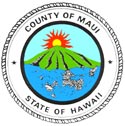25
May
Maui County Kicks Off Pesticide-Free Pilot Program to Transition to Organic Management
(Beyond Pesticides, May 25, 2017) Four parks in Maui, Hawaii, have kicked off a year-long pesticide-free pilot program to transition to organic management. A series of training events in the county over the past few weeks focused on soil-based approaches to land management, a more effective solution than solely switching from synthetic to organic pesticides. Last Wednesday, Beyond Pesticides’ executive director, Jay Feldman, and Chip Osborne, president of Osborne Organics, taught training sessions with county Parks and Recreation staff, “discussing lawn care that relies less on outside products and aims to feed the soil, not just the plant.” Beyond Pesticides worked to support the pesticide-free parks movement in Maui by sponsoring these training sessions for Maui County Parks, Department of Transportation, Maui public schools, several local resorts, and golf course management groups.

Beyond Pesticides is working with Maui County to provide guidance on transitioning its parks to organic practices. Analysis of soil samples at each site has been conducted, which will provide a baseline to implement cultural changes to improve the biological health of the soil, making it more resistant to weed and insect pressures. The next step includes creation of a report and action plan for each county park by Beyond Pesticides and Osborne Organics, detailing the timeline for implementing practices of soil improvement and long-term management. In discussing the parks’ pilot program with Maui News, Chip Osborne stated, “There was a lot of fungal life and a lot of bacterial life [in these soils], but it wasn’t active. All the years of pesticides and salt-based fertilizers had diminished it. So the first thing that’s going to happen – far more important than a bag of fertilizer – is to restore that biological level.”
There has been “an increase in resources and attention given to organic agriculture methods, but this is the first time efforts on this scale have been made to support organic landscape management,” Maui County Councilmember Elle Cochran told Maui Now about the local training events. The county has had mixed results with other alternative management strategies, including an aeration program by the Parks and Recreation Department that reduced the amount of pesticides and fertilizers used. According to Parks and Recreation Deputy Director, Brianne Savage, “Labor costs went up, chemical costs went down, though the department would have to do more analysis to determine whether the program was truly cost effective.” The organic management approach that Osborne and Beyond Pesticides taught the county is systems-based rather than a single tactic, and will save money over the long term by reducing outside inputs and generating nutrients naturally through improved soil health.
“This pilot program has been a couple of years in the making,” according to Elle Cochran, chairwoman of the Maui County Council’s Infrastructure and Environmental Management Committee. Maui’s pesticide-free parks program highlights the powerful change residents can make when they become engaged with their local elected officials. Communities throughout the country are realizing that the risks associated with pesticide use are simply not worth their health, the health of pollinators, or the wider environment.
The work Beyond Pesticides is conducting in Maui is similar to efforts undertaken in parks in the Reno, Nevada area. These programs aim to give land managers to knowledge, understanding, and tools necessary to make a broader transition to organic land care. Hopefully, successful pilot sites in Maui will lead to the passage of an ordinance that institutionalizes safer practices, as in many communities across the country.
In the past several years, Takoma Park and Montgomery County in Maryland passed ordinances banning the use of pesticides for cosmetic purposes on all property, in favor of organic practices. Nearly 20 communities in Maine have restricted pesticide use on private property in some way, including comprehensive cosmetic pesticide restrictions passed in Ogunquit and South Portland. In the summer of 2015, the City of Minneapolis, MN passed an organic, pollinator friendly resolution, committing the City to adopt clear guidelines against the use of synthetic pesticides. Communities in Colorado, including Lafayette, Boulder County, and the City of Boulder have restricted the use of bee-toxic pesticides on public spaces. As Beyond Pesticides’ Map of U.S. Pesticide Reform Policies shows, numerous other localities have already enacted pesticide-free parks programs with good success.
If you’re interested in getting active in your community to fight for an organic or pesticide-free policy, click here to sign the petition today. We’ll send you resources and strategies that you can use to win protections for children, pets, pollinators, wildlife, and water quality. Without action from local residents, states and localities will continue to rely on an increasingly politicized and underfunded EPA for their safeguards from toxic chemicals. For more information on passing your own community pesticide policy, see Beyond Pesticides’ Tools for Change webpage, or reach us at 202-543-5450 or [email protected].
All unattributed positions and opinions in this piece are those of Beyond Pesticides.
Source: The Maui News, Maui Now










